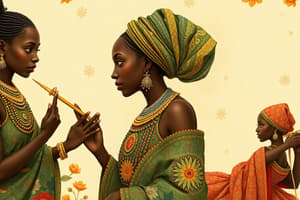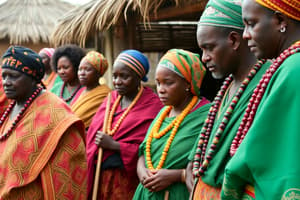Podcast
Questions and Answers
Ibi ti awọn ẹranko Yoruba ti ń gbé ni idi očo?
Ibi ti awọn ẹranko Yoruba ti ń gbé ni idi očo?
- Ìwọ̀ oòrùn Áfríkà (correct)
- Ìwọ̀ oòrùn Áfríkà (correct)
- Ìlà oòrùn Áfríkà
- Ẹgbẹ́ Apákan
Ọjọ tí ó ṣe àgbékalè Yoruba kingdom?
Ọjọ tí ó ṣe àgbékalè Yoruba kingdom?
- Ọdọ́dọ̀marẹ̀
- Ọ̀rànmíyàn
- Ọba Ifẹ̀
- Ọọ̀dúdúwà (correct)
Èdè tí ó jẹ́ àwọn ẹranko Yoruba ní ọ̀rọ̀?
Èdè tí ó jẹ́ àwọn ẹranko Yoruba ní ọ̀rọ̀?
- Èdè Igbo
- Èdè Yoruba (correct)
- Èdè Fulani
- Èdè Hausa
Ọ̀ríṣà tí ó ṣe olórí tirẹ̀ Ọlọ́dùmarẹ̀?
Ọ̀ríṣà tí ó ṣe olórí tirẹ̀ Ọlọ́dùmarẹ̀?
Ibikan ti a ti ṣe lórí ọ̀rọ̀ Yoruba?
Ibikan ti a ti ṣe lórí ọ̀rọ̀ Yoruba?
Òrìṣà Ọlọ́dùmarẹ̀ jẹ́?
Òrìṣà Ọlọ́dùmarẹ̀ jẹ́?
Ibi ti ó ṣe àgbékalè ọ̀rọ̀ Yoruba?
Ibi ti ó ṣe àgbékalè ọ̀rọ̀ Yoruba?
Ọrúko Ọba akọkọ ti Yoruba?
Ọrúko Ọba akọkọ ti Yoruba?
What is the number of consonant phonemes in the Yoruba language?
What is the number of consonant phonemes in the Yoruba language?
What is the tone system in Yoruba language?
What is the tone system in Yoruba language?
What is the word order in Yoruba language?
What is the word order in Yoruba language?
How are words formed in Yoruba language?
How are words formed in Yoruba language?
What is the function of the auxiliary verb 'yio' in Yoruba language?
What is the function of the auxiliary verb 'yio' in Yoruba language?
What is the feature of Yoruba language where multiple verbs are used in a single sentence?
What is the feature of Yoruba language where multiple verbs are used in a single sentence?
What is the feature of Yoruba language where the subject pronoun can be dropped in certain contexts?
What is the feature of Yoruba language where the subject pronoun can be dropped in certain contexts?
What is the term for words that evoke a sensory experience in Yoruba language?
What is the term for words that evoke a sensory experience in Yoruba language?
Flashcards are hidden until you start studying
Study Notes
Origins and History
- The Yoruba people are an ethnic group from West Africa, primarily residing in southwestern Nigeria and parts of Benin and Togo.
- The Yoruba kingdom dates back to the 7th century, with the city of Ife being its spiritual and cultural center.
Language
- The Yoruba language, also known as Yoruba, is a member of the Niger-Congo language family.
- It is spoken by approximately 30 million people, primarily in Nigeria, Benin, and Togo.
Religion
- Traditional Yoruba religion is based on the belief in a supreme deity, Olodumare, and a pantheon of Orishas (deities).
- The Ifa oracle plays a central role in Yoruba religion, guiding decisions and providing insight into the spiritual realm.
Culture
- Yoruba culture is known for its rich artistic and cultural heritage, including wood carvings, textiles, and bronze casting.
- The Yoruba people have a strong tradition of oral storytelling, music, and dance.
Social Structure
- Yoruba society is organized into kingdoms, with a monarch (Oba) as the central authority.
- The Oba is advised by a council of elders and chiefs, who are responsible for governing the kingdom.
Notable Figures
- Oduduwa: The legendary founder of the Yoruba kingdom and the first Oba of Ife.
- Oranmiyan: A legendary Yoruba warrior and leader who is said to have united the Yoruba kingdoms.
Modern Yoruba Identity
- The Yoruba people have maintained a strong cultural identity despite the influence of colonialism and modernization.
- The Yoruba diaspora has contributed to the spread of Yoruba culture globally, particularly in the Americas.
Ọ̀rúnmìlà àti Ìtàn
- Ẹgbẹ́ Yorùbá jẹ́ ẹ̀yà ara-ilẹ̀ Àfrica, ó wà lápapọ̀ nínú orílẹ̀-èdè Nàìjíríà, Bẹ̀nẹ̀, àti Tógò.
- Ìlú Ifẹ̀ jẹ́ ibùgbé òrúnmìlà àti ọ̀rọ̀ Yorùbá, ó bẹ̀rẹ̀ láti ẹgbẹ̀ ọdún 7.
Ẹ̀dè
- Ẹ̀dè Yorùbá jẹ́ ẹ̀dè kan tí ó wà lára ẹ̀ka Niger-Congo, ó sọ̀rọ̀ lápapọ̀ nínú àwọn ènìyàn 30 Ọ̀rụ́nítọ́ọ́ọ́, ó sì wà lápapọ̀ nínú orílẹ̀-èdè Nàìjíríà, Bẹ̀nẹ̀, àti Tógò.
Ìṣẹ̀ṣẹ̀
- Ìṣẹ̀ṣẹ̀ Yorùbá gbé lórí ìwà ọlọ́run Ọlódùmarè, àti òrìṣà (ẹ̀dá Ọ̀rúnmìlà).
- Ìfá jẹ́ òrìṣà kan tí ó ń ṣe àgbékalè fún ìwà ọlọ́run, òun ó sì ń ṣe àṣẹ̀ fún àwọn ènìyàn.
Àṣẹ̀ṣẹ̀
- Àṣẹ̀ṣẹ̀ Yorùbá mọ́ gbogbo ènìyàn lórí àṣẹ̀ṣẹ̀ àṣẹ̀ àti àṣẹ̀ṣẹ̀, inú àṣẹ̀ṣẹ̀ ère, àti ẹ̀re ìgbó.
Ọ̀rúnmìlà Àgbélí
- Ìlú Yorùbá máa ń ṣe àṣẹ̀ṣẹ̀ lórí àṣẹ̀ àgbélí, ó sì máa ń ṣe àṣẹ̀ṣẹ̀ àgbélí lórí àṣẹ̀ àṣẹ̀.
- Ọọ́bá jẹ́ olórí àṣẹ̀ṣẹ̀ àgbélí, ó sì máa ń ṣe àṣẹ̀ṣẹ̀ lórí àṣẹ̀ àgbélí.
Àgbélí Ọ̀rúnmìlà Tuntun
- Ẹgbẹ́ Yorùbá ti máa ń ṣe àṣẹ̀ṣẹ̀ àgbélí lórí àṣẹ̀ àgbélí, ó sì máa ń ṣe àṣẹ̀ṣẹ̀ àgbélí lórí àṣẹ̀ àṣẹ̀.
- Odùduwà jẹ́ olórí àṣẹ̀ṣẹ̀ àgbélí Yorùbá, ó sì jẹ́ àgbélí àkọ́kọ́ Ifẹ̀.
- Ọ̀rànmíyàn jẹ́ olórí àṣẹ̀ṣẹ̀ ọmọ Yorùbá, ó sì jẹ́ olórí àṣẹ̀ṣẹ̀ àgbélí Yorùbá.
Àkójọpọ̀ṣẹ̀ àwọn ẹ̀kọ́ Grammar ti Èdè Yorùbá
Fọ́nọ́lọ́jì
- Èdè Yorùbá ní síẹ̀mù fọ́nọ́lọ́jì tó ṣe pẹ́lú àwọn àgbékalè 25 àti àwọn àgbékalè 15.
- Èdè Yorùbá ní síẹ̀mù tónù mẹ́ta: tónù gbóná, tónù àlábápọ̀, àti tónù kéékẹ́èké.
- Èdè Yorùbá tún ní síẹ̀mù ẹ̀kọ́_pitch Accent_, nibiti pitch kan ṣe yípadé ànfì àwọn ọ̀rọ̀.
Mọ́rphọ́lọ́jì
- Èdè Yorùbá jẹ́ ẹ̀kọ́ àgbálè, pẹ̀lú síẹ̀mù àwọn àgbékalè àti àwọn prefixì.
- Àwọn ọ̀rọ̀ le ṣe pápákọ̀ sí mẹ́ta: irú àti àgbékalè.
- Èdè Yorùbá tún ní síẹ̀mù ẹ̀kọ́ conjugation, pẹ̀lú ọ̀pọ̀ àgbékalè irú.
Sẹ́ntẹnṣẹ̀
- Èdè Yorùbá ní síẹ̀mù SVO (Subject-Verb-Object), pẹ̀lú ẹ̀kọ́ àgbálè àti ẹ̀kọ́ àṣẹ̀.
- Èdè Yorùbá tún ní síẹ̀mù ẹ̀kọ́ serialization, nibiti àwọn ọ̀rọ̀ mẹ́rin le ṣe fi ẹ̀kọ́ kan jẹ́.
- Èdè Yorùbá tún ní síẹ̀mù ẹ̀kọ́ clause chaining, nibiti àwọn ẹ̀kọ́ mẹ́rin le ṣe fi ẹ̀kọ́ kan jẹ́.
Tẹ́nṣẹ̀ àti Àṣẹ̀
- Èdè Yorùbá ní síẹ̀mù ẹ̀kọ́ tense àti aspect, pẹ̀lú àwọn fọ́rmù mẹ́rin mẹ́rin.
- Èdè Yorùbá tún ní síẹ̀mù ẹ̀kọ́ distinction, nibiti àwọn àgbékalè mẹ́rin le ṣe yà ẹ̀kọ́ mẹ́rin.
- Èdè Yorùbá tún ní síẹ̀mù ẹ̀kọ́ future tense, pẹ̀lú àwọn auxiliary verb "yio" (will).
Àkójọpọ̀ṣẹ̀ Òfin
- Èdè Yorùbá ní síẹ̀mù ẹ̀kọ́ focus marking, pẹ̀lú àwọn morphemesùnù mẹ́rin.
- Èdè Yorùbá tún ní síẹ̀mù ẹ̀kọ́ relativization, pẹ̀lú àwọn morphemesùnù mẹ́rin.
- Èdè Yorùbá tún ní síẹ̀mù ẹ̀kọ́ clause chaining, nibiti àwọn ẹ̀kọ́ mẹ́rin le ṣe fi ẹ̀kọ́ kan jẹ́.
Àwọn Ìrírí Ọ̀túnṣẹ̀
- Èdè Yorùbá jẹ́ ẹ̀kọ́ pro-drop language, nibiti àwọn àgbékalè kan le ṣe yà ẹ̀kọ́ mẹ́rin.
- Èdè Yorùbá tún ní síẹ̀mù ẹ̀kọ́ ideophones, pẹ̀lú àwọn ọ̀rọ̀ mẹ́rin.
- Èdè Yorùbá tún ní síẹ̀mù ẹ̀kọ́ oral literature, pẹ̀lú àwọn ọ̀rọ̀ mẹ́rin.
Studying That Suits You
Use AI to generate personalized quizzes and flashcards to suit your learning preferences.




